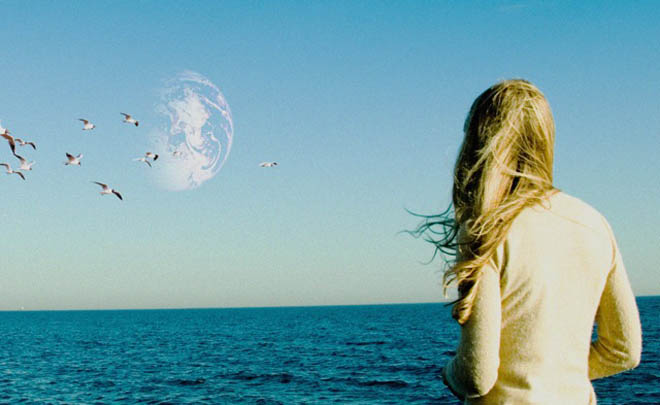Another Earth
Directed by Mike Cahill
2011, USA
“Does anybody have any idea what they’re about to see?” The question from Janet Pierson, producer of the SXSW Film Festival, elicits a rumbling of shouts from the audience at the Paramount Theater. So many films are being yelled out at the same time that Pierson can’t understand a single one. Each year SXSW screens a secret film and during the days leading up to it, participants fill each other’s ears with rumors about what it’s going to be. That morning while standing in line for my press passes, I heard a rumor that the secret screening was going to be Cowboys and Aliens.
There were no aliens on screen that afternoon, but there was a parallel world looming large overhead. The secret film was Another Earth, which premiered at Sundance this year and won both the Special Jury Prize for the U.S. dramatic category and the Sloan Prize, which is awarded to films with science/technology content.
But the science portion of Another Earth isn’t at the forefront of the story. Rather, it serves as a backdrop for a self-sabotaging romance. Rhoda Williams (Brit Marling) is a brand new college student at MIT whose childhood room is filled with posters of planets and telescopes. But instead of college, she ends up spending the next 4 years in jail after a fatal drunk driving accident where she is at fault. The accident and the consequential derailing of Rhoda’s life, is perfectly timed with her first glimpse out the car window, of a glowing blue dot in the sky.
By the time Rhoda is released from prison scientists have determined that the glowing blue dot, whose image has grown fuller and clearer in the sky, is actually a mirror image of Earth. Incredibly, this subtle, minimalist film with a tiny budget convincingly takes a complex, sci-fi concept and makes it feel real. Actress Brit Marling, who co-wrote the film with Director Mike Cahill, attributes this to a generation of movie-watchers who are well versed in the language of film. Through visual motifs, sound bytes from the radio, television news clips and eerie music, the audience is easily able to imagine everything in between.
It also helps that Cahill creates an environment similar to the one during the moon landing where everyone remembers what they were doing when they first heard about “Earth 2” or saw it in the sky. The scene where Rhoda’s family is gathered around the television watching a newscaster make fuzzy communication with the other Earth is reminiscent of the broadcasting of Armstrong’s first steps on the moon.
But as an audience, what we care about is Rhoda’s tortured story as she goes about her life a paler version of herself, revisiting the site of the crash and even the house of the sole survivor of the car she hit. Marling and Cahill use the idea of a parallel earth as a tool for allowing the characters to face themselves in ways they normally wouldn’t be able to. And Rhoda is someone who really needs to face herself. Someone who, in Marling’s words, “can’t let herself off the hook for what she’s done.” There are some kitschy moments that make the audience wonder whether they’re supposed to laugh or not, like when Rhoda goes online to enter a contest to win a trip to Earth 2 with a space adventure corporation. But overall, it’s a film that refreshingly adds a new element to a story that’s already been told. It’s finely stitched together and well acted by both Marling and William Mapother.
Alice Gray


